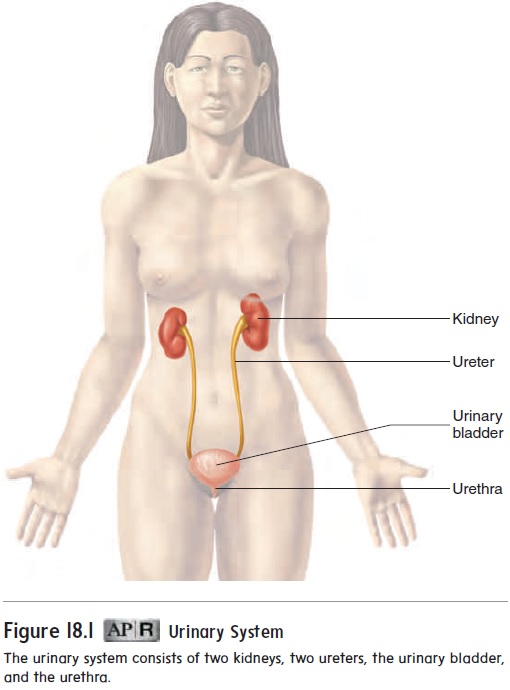Chapter: Essentials of Anatomy and Physiology: Urinary System and Fluid Balance
Functions of the Urinary System
FUNCTIONS OF THE URINARY SYSTEM
Although you probably know that each person has two kidneys and you most likely can identify their general location, you may not be aware of the many functions the kidneys perform. On the other hand, you probably have a much better understanding of the func-tion of the urinary bladder and a great appreciation for the attention required when it is filled with the urine produced by the kidneys.
The urinary (̄u r′ i-n̄a r-̄e ) system consists of two kidneys, two ureters, the urinary bladder, and the urethra (figure 18.1). A large volume of blood flows through the kidneys, which remove substances from the blood to form urine. The urine contains excess water and ions, metabolic wastes (such as urea), and toxic substances. The urine produced by the kidneys flows through the ureters to the urinary bladder, where it is stored until it is elimi-nated through the urethra.

The kidneys can suffer extensive damage and still maintain their extremely important role in the maintenance of homeostasis. As long as about one-third of one kidney remains functional, survival is possible. However, if the functional ability of the kid-neys fails completely, death will result unless the person receives medical treatment.
The major function of the urinary system is to control the composition and volume of body fluids. The kidneys perform this function through multiple processes:
1. Excretion. The kidneys are the major excretory organs ofthe body. They remove waste products from the blood. Many waste products are toxic, but most are metabolic by-products of cells and substances absorbed from the intestine. The skin, liver, lungs, and intestines eliminate some of these waste products, but they cannot compensate if the kidneys fail to function.
2. Regulation of blood volume and pressure. The kidneys playa major role in controlling the extracellular fluid volume in the body. They can produce either a large volume of dilute urine or a small volume of concentrated urine. Thereby, the kidneys regulate blood volume and blood pressure.
3. Regulation of the concentration of solutes in the blood.nThe kidneys help regulate the concentration of the majornmolecules and ions, such as glucose, Na+, Cl−, K+, Ca2+, HCO3−, and HPO42−.
4. Regulation of extracellular fluid pH. The kidneys excretevariable amounts of H+ to help regulate extracellular fluid pH.
5. Regulation of red blood cell synthesis. The kidneys secretea hormone, erythropoietin, which regulates the synthesis of red blood cells in bone marrow .
6. Regulation of vitamin D synthesis. The kidneys play animportant role in controlling blood levels of Ca2+ by regulating the synthesis of vitamin D
Related Topics